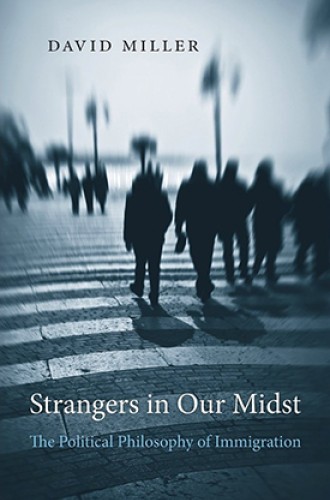Are open borders the most ethical approach to immigration?
David Miller’s book doesn’t offer policy solutions. It does help us think clearly.
How to keep balanced on an issue like immigration? At one extreme, some want to build walls and exclude Muslims. At the other, generous souls (many of them Christians) would extend unconditional welcome for unlimited numbers of uninvited arrivals. Is there a moral position between these two views—a position that would treat with dignity, compassion, and generosity those who seek to live in our country but would also honor a nation’s need to control its borders and reasonably limit immigrant flows? David Miller thinks so.
Miller, a careful philosopher and professor of political theory at Oxford University, begins by asking the fundamental questions: Why does a nation have a moral right to exclude anyone who wants to enter? If all human life is of equal worth, why should one’s fellow citizens matter more than “strangers” who want to enter and join the nation?
Read our latest issue or browse back issues.
While Miller respects the strong cosmopolitanism that motivates such questions, he eventually settles on what he calls a “weak cosmopolitanism,” in which a nation is morally justified in limiting entry in accordance with the interests and wishes of its citizens, subject to two requirements: (1) that adequate provision be made for admitting genuine political refugees, and (2) as to non-refugees, that reasons must be given (subject to public debate) when exclusion is necessary. This stance, he contends, meets the minimum standard of justice; more expansive policies of entry may be desirable on humanitarian grounds but are not required by justice.
Miller grounds the moral justification for privileging current inhabitants over applicants for admission (and thus the right to control immigration) in each country’s right of national self-determination. The fact that compatriots within the boundaries of a nation self-identify as citizens of that state has intrinsic social worth, he argues, because it supports a structure of mutual solidarity which, in turn, nurtures the feeling that such citizens “belong together and have responsibilities to each other.” This mutual fellow-feeling authorizes individual sacrifice for the greater good, which undergirds the complex scheme of cooperation that constitutes a democratic nation-state. An unlimited flow of immigrants not subject to legal restrictions could undermine that accomplishment.
So, who should enter? Miller distinguishes sharply between economic migrants—those pursuing work and a better life—and asylum-seeking refugees with a “well-founded fear” of persecution or death in their home country on the basis of “race, religion, nationality, membership of a particular social group, or political opinion.” This is the definition of the 1951 Geneva Convention, which is also the standard under U.S. law. Miller argues for a broader definition: those whose lives or fundamental human rights are in jeopardy and cannot be protected except by moving across a border, whether because of state persecution, state incapacity to protect, or prolonged natural disasters.
Refugees fleeing to avoid persecution or to save their lives are entitled to our deepest sympathy—and deserve the fulfillment of our obligations under international law. But even here hard choices must be made, especially if the number of refugees is overwhelming, as it currently is in several states of the European Union. If the number of refugees is more than a state reasonably can absorb, how should it decide whom to admit and whom to refuse?
One answer is random selection: a lottery. Another is a particularized determination based on such factors as the extremity of the refugee’s hardship, the absence of alternatives for the refugee, or the likelihood of successful integration into the host society. Miller does not draw a definitive line between what is morally required and what is morally desirable on humanitarian grounds, but his thoughtful discussion of the alternatives provides a principled framework within which an ethical line could be debated.
Economic migrants, understood broadly to include those seeking a better life for themselves and their families, also have a moral claim to admission. But it is more qualified than that of refugees. In such cases, Miller finds it permissible to condition entrance on “mutual advantage,” including what the migrant brings to the host society in needed skills or economic benefits. He also argues that a host society may consider the extent and degree of cultural differences between immigrants and current residents, particularly since admission of immigrants implies a moral obligation to provide the conditions under which they may be incorporated into society on terms of equality. Incorporation entails social costs, fiscal and otherwise, which are properly part of the calculation.
Miller insists that an additional factor must be considered: negative effects on the migrant’s home country, such as the loss of talented or well-educated persons needed in the development of the country left behind. The more advanced societies must not be indifferent to the harm of causing a “brain drain” on less developed countries for the benefit of the better-off host countries. Miller doesn’t specify how exactly one balances the mutual advantage that favors the admission of economic migrants against the brain drain that should count against such admission.
Strangers in Our Midst is not a handbook of political solutions, nor a roadmap to equitable immigration policies. Rather, it is a work of political and moral theory, with the advantages and disadvantages of such a work. The chief advantage is a contribution to clear thinking—much needed at present. Thus, for example, the distinction between the minimum requirements of justice and, above that level, the permissible range of democratic alternatives, is a valuable aid to parsing the moral arguments for and against more open borders. More generally, the book identifies the values that lie beneath various arguments and clarifies the moral considerations that ought to be part of any public debate, including principles that set limits on the moral permissibility of certain reasons supporting open or closed borders.
Miller is most useful not in proposing answers to which everyone will subscribe, but in proposing questions in such a way and within such a context that there can be common moral ground among those who disagree on specifics, and thus an improved prospect of progress toward workable and effective solutions.
A version of this article appears in the April 12 print edition under the title “Justice and open borders.”






